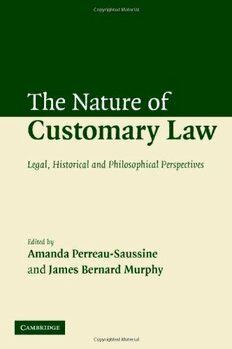
The Nature of Customary Law: Legal, Historical and Philosophical Perspectives PDF
350 Pages·2007·1.854 MB·English
Most books are stored in the elastic cloud where traffic is expensive. For this reason, we have a limit on daily download.
Preview The Nature of Customary Law: Legal, Historical and Philosophical Perspectives
Description:
Some legal rules are not laid down by a legislator but grow instead from informal social practices. In contract law, for example, the customs of merchants are used by courts to interpret the provisions of business contracts; in tort law, customs of best practice are used by courts to define professional responsibility. Nowhere are customary rules of law more prominent than in international law. The customs defining the obligations of each State to other States and, to some extent, to its own citizens, are often treated as legally binding. However, unlike natural law and positive law, customary law has received very little scholarly analysis. To remedy this neglect, a distinguished group of philosophers, historians and lawyers has been assembled to assess the nature and significance of customary law. The book offers fresh insights on this neglected and misunderstood form of law.
See more
The list of books you might like
Most books are stored in the elastic cloud where traffic is expensive. For this reason, we have a limit on daily download.
